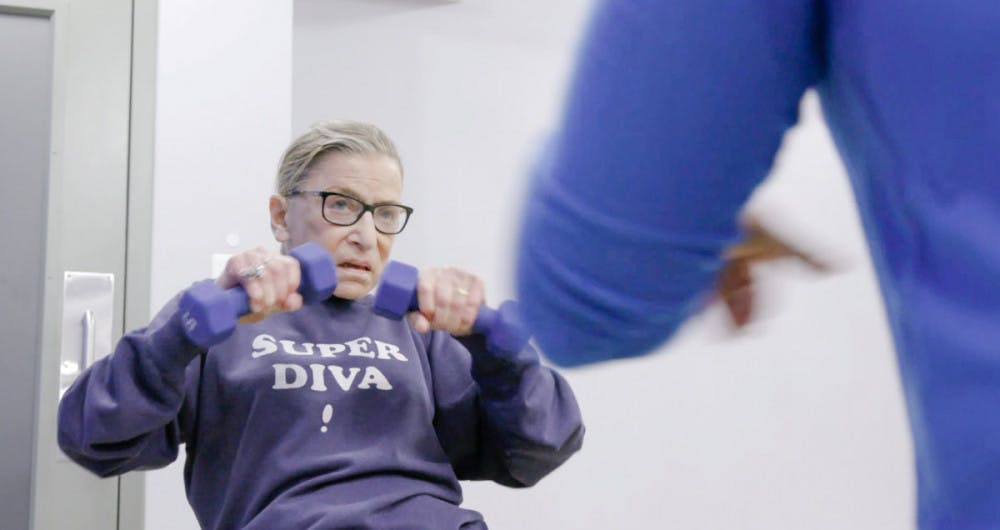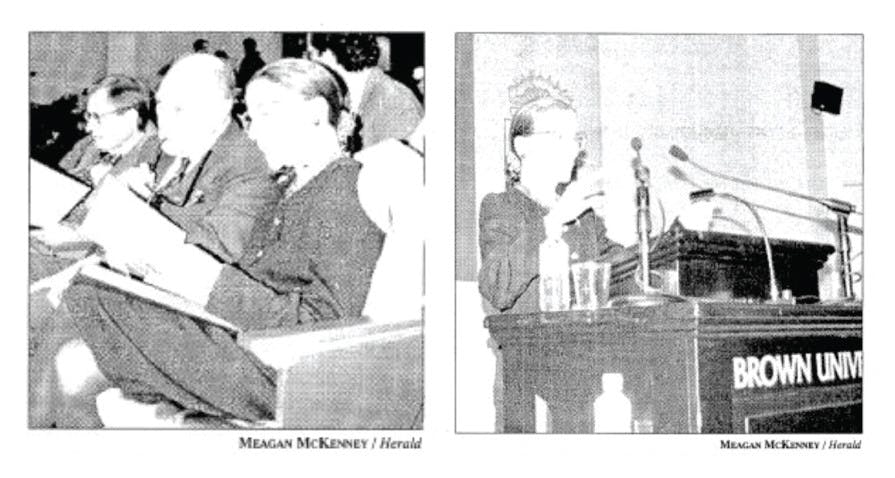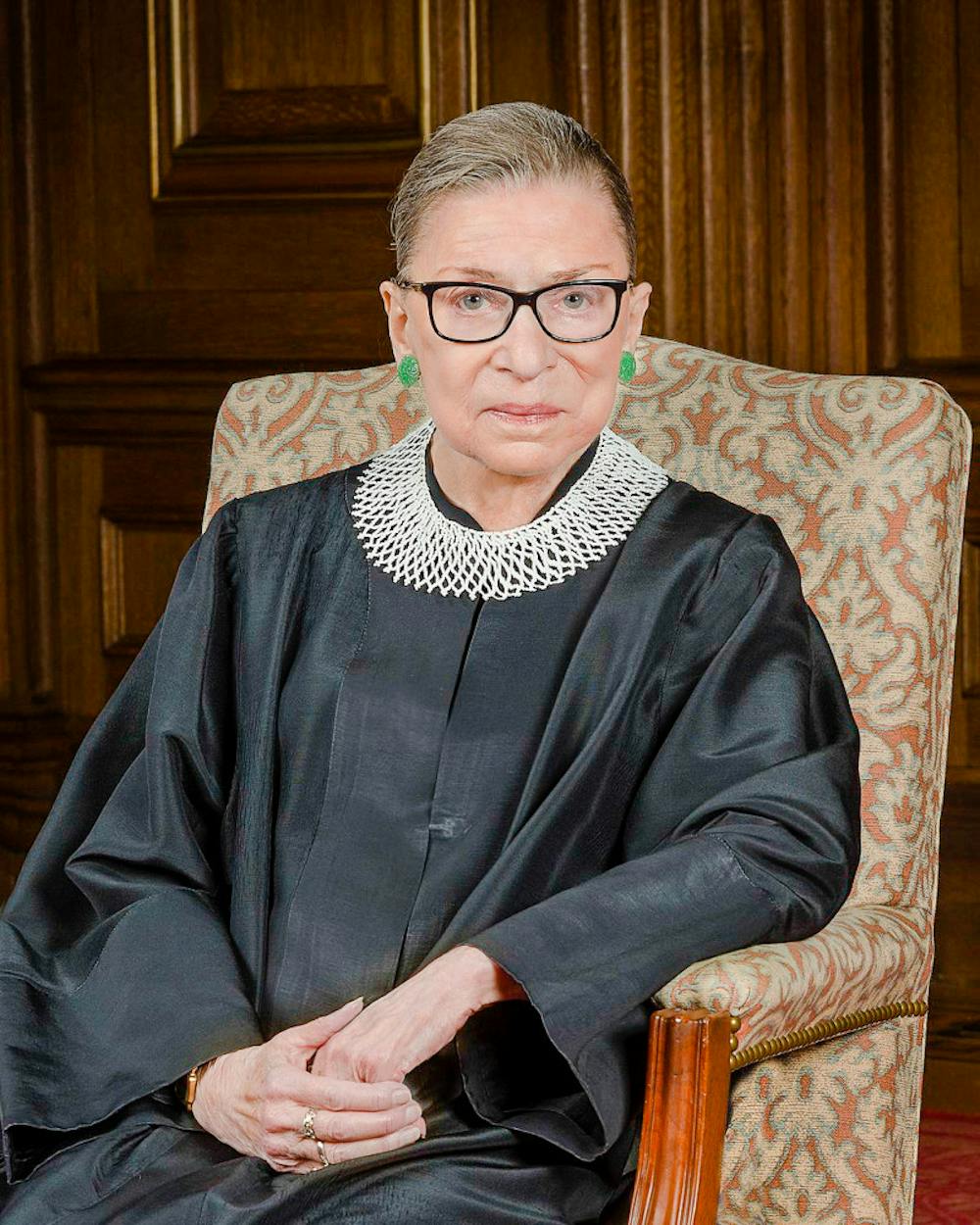In 2002, Supreme Court Justice Ruth Bader Ginsburg delivered the baccalaureate address to the University’s graduating seniors and told a story about a time a student asked her what America’s biggest problem would be as the new century began.
“The challenge,” Ginsburg related to the student, and then to the class of 2002, “is to make or keep our communities places where we can understand, accommodate, even celebrate, our differences, while pulling together for the common good.”
Ginsburg spoke of her main aspiration for the country and the world: the United States’ motto, E Pluribus Unum, which means “Of many, one.” To the audience, Ginsburg said, “I urge all of you, in the Brown tradition, to play a part in achieving that high aspiration.”
Nearly two decades later, the University community is once again contemplating Justice Ginsburg’s words, following her death Sept. 18.
Alongside people around the world, University community members are grieving her loss, reflecting on her legacy and wondering what her now-empty seat on the United States’ highest court means for the future.
Political impact
“Her impact is titanic,” Visiting Assistant Professor of the Practice of Political Science Jeffrey Robbins told The Herald. “But that impact of course began long before she was appointed to the Supreme Court. Her litigation in federal courts and in the Supreme Court in particular on behalf of equal rights shaped the course of civil rights jurisprudence over the last couple of generations.”
Ginsburg, often referred to as “RBG,” was the second woman after Sandra Day O’Connor to serve on the Supreme Court. She is notable not only for her dissents on the Court, but for her lifelong fight for gender equality and women’s rights.
"Her impact is titanic. ... But that impact of course began long before she was appointed to the Supreme Court."
Initially a moderate voice on the Court after being appointed by President Bill Clinton in 1993, Ginsburg shifted to the left over time as the Court gained a stronger conservative bloc, delivering famous dissents in civil and women’s rights cases. Her 2007 dissent in Ledbetter v. Goodyear Tire & Rubber Co. prompted the Obama administration to push equal pay legislation through Congress in 2009.
Her “blistering dissents galvanized people,” Betsy West ’73 P’17 told The Herald.
West produced and directed “RBG,” an Academy Award-nominated documentary on the life of the late justice. The film explores Justice Ginsburg’s career, as well as her rise to icon status. After a young law student nicknamed her the “Notorious R.B.G.” — a nod to rapper Notorious B.I.G. — Ginsburg and her work drew attention from younger generations.
Ginsburg “understood that her increasing notoriety, her celebrity, her superfandom, gave her an opportunity to connect with a whole group of people who don’t pay much attention to what goes on in the Supreme Court,” West said. “For her to spread the ideas about the things that she truly believes in — our democracy, the importance of the Equal Protection Clause to protect minorities and women, the rule of law — all of these ideas were something that emanated out of the Notorious R.B.G.”
[caption id="" align="aligncenter" width="1200"]

In tandem with grief and admiration, many are considering the ramifications of Ginsberg’s now-empty seat.
Visiting Professor of the Practice of Political Science Richard Arenberg believes that President Trump’s nominee for the position will likely be confirmed by the Senate before Nov. 3. “This will have an enormous impact on the Court, shifting it significantly to the right. Chief Justice Roberts, as the (current) swing vote, could no longer control the outcome on closed cases,” he wrote in an email to The Herald.
In anticipation of contested election results, Trump has pushed for the confirmation of a ninth justice to avoid the possibility of a four-four split if the Supreme Court is forced to decide the outcome of the presidential election.
Trump announced on Saturday that he had selected Federal Judge Amy Coney Barrett to fill Ginsburg’s vacant seat. Barrett is a former mentee of the late Justice Antonin Scalia — one of Ginsburg’s closest friends on the bench, despite their opposing political opinions.
Claire Heiden ’21 is an aspiring lawyer who considers Ginsburg a role model and legal icon who did “so much for women” in a court historically dominated by men. Trump’s nominee “needs to stand for human rights and human dignity in the same way that (Ginsberg) did,” Heiden told The Herald. “While I think that the court should be way more gender equitable, I don’t think the identity of the new nominee matters as much as their beliefs.”
Lasting Legacy
“To know that she’s gone, it’s a lot of despair,” Heiden said. “And particularly given this political moment, there’s a lot of fear because of course her legacy could be completely tarnished depending on whether the Republican Party is able to secure the nomination of a new justice before the election.”
[caption id="" align="aligncenter" width="895"]

Osayuwamen Ede-Osifo ’22 said that she hopes that Ginsburg paved the way for more non-white women to enter politics. She said she looks up to Ginsburg because of her dedication to American democracy and the important precedents she set.
“When I think of RBG I don’t necessarily see myself in her descriptively,” Ede-Osifo wrote in an email to The Herald. “But I see myself in her as an individual trying to leave a positive impact on my world.”
Ginsburg’s legacy demands nuanced conversation, said Wassa Bagayoko ’21. Bagayoko is an aspiring lawyer who noted that Ginsburg “turned her back on people of color in the United States in many different ways.”
“When I think of RBG I don’t necessarily see myself in her descriptively, but I see myself in her as an individual trying to leave a positive impact on my world.”
Bagayoko said she specifically takes issue with opinions Ginsburg wrote that went against the interests of Indigenous people, as well as comments she made about Colin Kaepernick’s national anthem protests in 2016, calling them “dumb” and “disrespectful.” Ginsburg apologized for the comments soon after making them.
But her concerns do not erase Ginsburg’s accomplishments as a woman on the Supreme Court, Bagayoko said. “We tend to look at (historical figures) in a very black-and-white way, but people are gray,” she said. “I would like to see more acknowledgement of her shortcomings as a justice.”
West said she remains optimistic as she honors Ginsburg’s legacy.
“I am trying to channel Justice Ginsburg’s optimism because she was a very optimistic person. She did believe in the Martin Luther King dictum — that the arc of history is long, but it bends toward justice,” West said. “It does seem like we’re in a very difficult time right now. But I think it is inspiring to see all of the people who have been so moved by Justice Ginsburg and by her legacy.”





